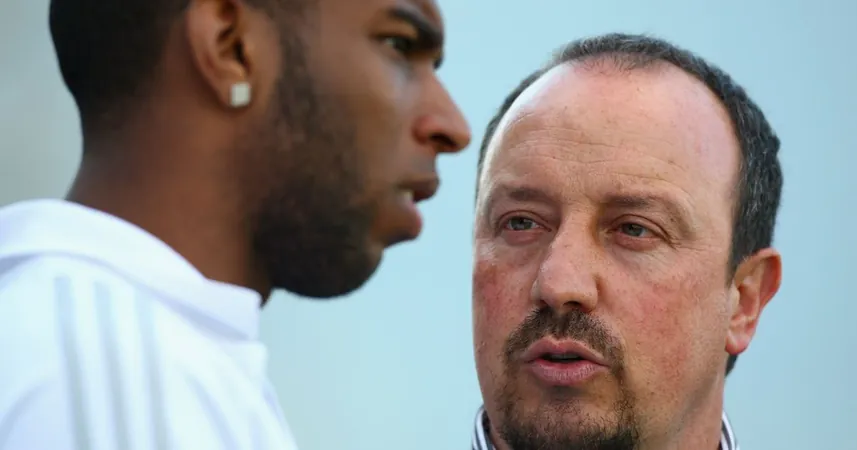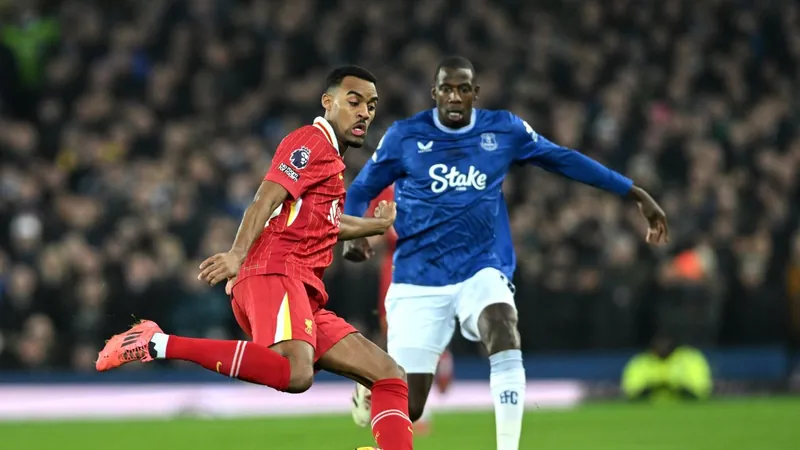
Ryan Babel’s Shocking Revelations: How Rafa Benitez Left Him Feeling Betrayed
2025-01-03
Author: Arjun
Introduction
In an exclusive interview, former Liverpool player Ryan Babel has candidly discussed the contentious relationship he had with his ex-manager, Rafa Benitez, as they mark 15 years since the Spaniard's departure from Anfield. Babel's comments bring to light the struggles he faced under Benitez’s management, which have left a lasting impression on both his career and his personal journey.
Rafa Benitez's Legacy
Rafa Benitez, who is often celebrated as a Liverpool legend for guiding the team to victory in the 2005 Champions League Final against AC Milan, departed the club amidst clashes with management and players alike. While he enjoyed significant successes, nearly all of which highlight his tactical brilliance, Benitez's controversial management style has been scrutinized by several players, including Babel.
Babel's Arrival at Liverpool
Babel arrived at Liverpool in 2007 from Ajax, under the impression that he would receive the proper training and development essential for his growth as a young player. However, the Dutch forward claimed that his expectations were soon dashed after he discovered the promises made by Benitez were not fulfilled.
Struggles and Expectations
“I was promised time, guidance, and development. Instead, I found myself isolated without the necessary individual coaching. I quickly realized the transition from Dutch football to the English league was far more significant than I had anticipated,” Babel explained. The pressure was immense, with a hefty transfer fee of £11.5 million looming over him, creating an immediate demand for results that he was not prepared to meet.
Feeling Overlooked
Throughout his three and a half years at Liverpool, Babel made 146 appearances, but often found himself on the sidelines. He revealed that increased competition for starting positions made it difficult to secure a place in the squad. “It was confusing for a young player to perform well in training only to be overlooked for matchday selections week after week,” he lamented.
Frustrating Exchanges
Furthermore, Babel shed light on the frustrating exchanges with Benitez. “Whenever I sought clarity, I was often told to simply 'shut up and work hard.' This response left me feeling lost, struggling to understand his expectations,” he added. These feelings of abandonment culminated in Babel publicly expressing his dissatisfaction when he was dropped from the squad against Stoke City in January 2010.
The Aftermath of Benitez's Departure
As Benitez faced mounting pressure from club management and fans due to lackluster performances, Babel found himself fine-tuned for his concerns rather than heard. When Babel wished to seek answers, the dismissal only intensified feelings of resentment.
Lack of Closure
After Benitez vacated the role of Liverpool manager at the end of that season, Babel noted that there was no parting conversation between them—an indication of the unresolved issues lingering from their time together. He recalled crossing paths briefly years later when he joined Fulham, yet the unresolved tensions from their earlier relationship still weigh heavily on him.
Reflection on Career
“Although I have many positive memories from my time at Liverpool, my relationship with Rafa certainly clouds it. I recognize that managers play a pivotal role in a player's career, and Rafa’s management style shaped how I was perceived,” Babel acknowledged.
Final Thoughts
Despite the obstacles faced, Babel has come to terms with how Liverpool fans remember him—not just as a player with unfulfilled potential, but as a talented individual who should have had more opportunities to shine. “I think they remember me for my long-range shooting and skills, but there’s always that lingering question of what might have been,” he concluded.
Conclusion
As Babel reflects on his career, it’s clear that the lessons learned during his tumultuous tenure at Anfield have stayed with him, shaping not only his footballing journey but also his understanding of the complexities of player-manager relationships.

 Brasil (PT)
Brasil (PT)
 Canada (EN)
Canada (EN)
 Chile (ES)
Chile (ES)
 Česko (CS)
Česko (CS)
 대한민국 (KO)
대한민국 (KO)
 España (ES)
España (ES)
 France (FR)
France (FR)
 Hong Kong (EN)
Hong Kong (EN)
 Italia (IT)
Italia (IT)
 日本 (JA)
日本 (JA)
 Magyarország (HU)
Magyarország (HU)
 Norge (NO)
Norge (NO)
 Polska (PL)
Polska (PL)
 Schweiz (DE)
Schweiz (DE)
 Singapore (EN)
Singapore (EN)
 Sverige (SV)
Sverige (SV)
 Suomi (FI)
Suomi (FI)
 Türkiye (TR)
Türkiye (TR)
 الإمارات العربية المتحدة (AR)
الإمارات العربية المتحدة (AR)